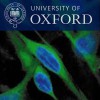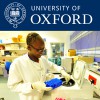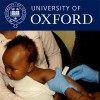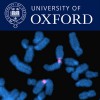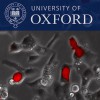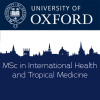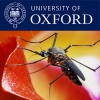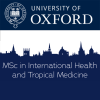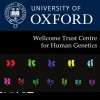Nuffield Department of Clinical Medicine
Relevant Links
The Nuffield Department of Medicine (NDM) is a large multi-disciplinary Department that links high quality basic biological science with medical application. Led by Professor Peter Ratcliffe FRS, who is both an active researcher in cell biology and an active clinician, the Department employs in the region of 1000 scientific research staff working in a range of basic science and clinical disciplines. Our researchers contribute to the teaching of 450 medical students within Oxford University's Clinical School.
Our base at the Headington Hospitals campus, Oxford, is now one of the largest centres for biomedical research in Europe with over £200M invested in capital projects and research infrastructure over the last decade. The rapidly growing campus provides a vibrant, highly interactive environment for research development. We are particularly committed to the career development of young scientists, including those from basic science as well as clinical backgrounds. In 2006 the Oxford University / Oxford Radcliffe Hospital Trust partnership successfully competed to be one of five UK Biomedical Research Centres. We played a leading role in this initiative, which provides a range of new opportunities for basic scientists to interact with clinical medical research, and for career development of clinician scientists.
In addition to its Oxford base, the Department operates a number of major overseas programmes in tropical medicine and global health, with research units in Thailand, Laos, Vietnam and Kenya supporting activities at numerous sites in S-E Asia and Sub-Saharan Africa. We also operate extensive epidemiological and clinical trials networks throughout China, India and South America.
In Oxford, NDM maintains research platforms across structural biology, protein biochemistry, genetics, genomics, proteomics, cell biology, chemical and genetic screening, imaging, bioinformatics, medical statistics, epidemiology, and clinical trials. Thematic research includes cancer biology, immunology, vaccinology, infectious diseases, gastroenterology, dermatology, diabetes and metabolic medicine, renal medicine, respiratory medicine, stroke medicine, and geratology.
Series associated with Nuffield Department of Clinical Medicine
| # | Episode Title | Description | People | Date | |
|---|---|---|---|---|---|
| 299 | Creative Commons | Artemisinin Resistance | Artemisinins are very poweful tools in the treatment of malaria, and the emerging loss of their activity has the potential to create a major public health problem. | Charlie Woodrow | 05 Oct 2015 |
| 298 | Creative Commons | The ethics of research | Identifying and addressing ethical issues are key to the success of any clinical trials, particularly when working with vulnerable populations. | Phaik Yeong Cheah | 05 Oct 2015 |
| 297 | Creative Commons | Science and Society | In settings with high level of poverty and over-stretched health services, researchers have even greater responsibilities to the communities and study participants. | Vicki Marsh | 05 Oct 2015 |
| 296 | Creative Commons | Melanoma | Melanoma or skin cancer is one of the fastest rising cancer types. When identified early, melanoma is relatively easy to cure, but once it starts to metastasise, it becomes very difficult to treat. | Colin Goding | 05 Oct 2015 |
| 295 | Creative Commons | Targeting epigenetics to treat cancer | Transcription is a tightly regulated process, where chemical modifications initiate the duplication of genetic material. This epigenetic process is often dysregulated in cancer, but it can be targeted with small molecule inhibitors. | Panagis Filippakopoulos | 05 Oct 2015 |
| 294 | Creative Commons | Artemisinin Resistance | Artemisinins are very poweful tools in the treatment of malaria, and the emerging loss of their activity has the potential to create a major public health problem. | Charlie Woodrow | 05 Oct 2015 |
| 293 | Creative Commons | The ethics of research | Identifying and addressing ethical issues are key to the success of any clinical trials, particularly when working with vulnerable populations. | Phaik Yeong Cheah | 05 Oct 2015 |
| 292 | Creative Commons | Science and Society | In settings with high level of poverty and over-stretched health services, researchers have even greater responsibilities to the communities and study participants. | Vicki Marsh | 05 Oct 2015 |
| 291 | Creative Commons | Melanoma | Melanoma or skin cancer is one of the fastest rising cancer types. When identified early, melanoma is relatively easy to cure, but once it starts to metastasise, it becomes very difficult to treat. | Colin Goding | 05 Oct 2015 |
| 290 | Creative Commons | Targeting epigenetics to treat cancer | Transcription is a tightly regulated process, where chemical modifications initiate the duplication of genetic material. This epigenetic process is often dysregulated in cancer, but it can be targeted with small molecule inhibitors. | Panagis Filippakopoulos | 05 Oct 2015 |
| 289 | Creative Commons | A deep breath in | Asthma and COPD (chronic obstructive pulmonary disease) are common conditions that affect the lives of many people. | Mona Bafadhel | 28 Jul 2015 |
| 288 | Creative Commons | Chemistry, epigenetics and drugs | Alteration of gene expression is fundamental to many diseases. A better understanding of how epigenetic proteins affect diseases provides a starting point for therapy development and the discovery of new drug. | Paul Brennan | 28 Jul 2015 |
| 287 | Creative Commons | The genetics of metabolic diseases | A missing step in a metabolic pathway leads to the build-up of toxic compounds, and the lack of materials essential for normal function. | Wyatt Yue | 28 Jul 2015 |
| 286 | Creative Commons | The economics of tropical diseases | Economics and health are interlinked in many ways, as seen in the vicious cycle between poverty and ill health. | Yoel Lubell | 28 Jul 2015 |
| 285 | Creative Commons | Getting the dose right | Too high a dose can result in toxicity and side-effects, too low a dose can cause the illness to come back and at worse develop resistance. | Joel Tarning | 28 Jul 2015 |
| 284 | Creative Commons | A deep breath in | Asthma and COPD (chronic obstructive pulmonary disease) are common conditions that affect the lives of many people. | Mona Bafadhel | 28 Jul 2015 |
| 283 | Creative Commons | Chemistry, epigenetics and drugs | Alteration of gene expression is fundamental to many diseases. A better understanding of how epigenetic proteins affect diseases provides a starting point for therapy development and the discovery of new drug. | Paul Brennan | 28 Jul 2015 |
| 282 | Creative Commons | The genetics of metabolic diseases | A missing step in a metabolic pathway leads to the build-up of toxic compounds, and the lack of materials essential for normal function. | Wyatt Yue | 28 Jul 2015 |
| 281 | Creative Commons | The economics of tropical diseases | Economics and health are interlinked in many ways, as seen in the vicious cycle between poverty and ill health. | Yoel Lubell | 28 Jul 2015 |
| 280 | Creative Commons | Getting the dose right | Too high a dose can result in toxicity and side-effects, too low a dose can cause the illness to come back and at worse develop resistance. | Joel Tarning | 28 Jul 2015 |
| 279 | Creative Commons | Enteric fever | Dr Christiane Dolecek speaks about the research on enteric fever she conducted in Vietman and Nepal | Christiane Dolecek | 20 May 2015 |
| 278 | Creative Commons | Enteric fever | Dr Christiane Dolecek speaks about the research on enteric fever she conducted in Vietman and Nepal. | Christiane Dolecek | 20 May 2015 |
| 277 | Creative Commons | Oxford University Clinical Research Unit Vietnam (OUCRU) | The Oxford University Clinical Research Unit (OUCRU) is a large-scale clinical and public health research unit based in Vietnam. | Guy Thwaites | 13 Apr 2015 |
| 276 | Creative Commons | Oxford University Clinical Research Unit Vietnam (OUCRU) | The Oxford University Clinical Research Unit (OUCRU) is a large-scale clinical and public health research unit based in Vietnam. | Guy Thwaites | 13 Apr 2015 |
| 275 | Creative Commons | Emerging Infectious Diseases | Professor Peter Horby is Senior Clinical Research Fellow. His research focusses on epidemic diseases such as Ebola and bird flu, and crosses the disciplines of basic science, medical science and public health. | Peter Horby | 11 Mar 2015 |
| 274 | Creative Commons | Emerging Infectious Diseases | Professor Peter Horby is Senior Clinical Research Fellow. His research focusses on epidemic diseases such as Ebola and bird flu, and crosses the disciplines of basic science, medical science and public health. | Peter Horby | 11 Mar 2015 |
| 273 | Creative Commons | Human Cancer Genetics | Dr Gareth Bond, Associate Member of the Ludwig Institute for Cancer Research, studies the influence of genetic variants on the origins, progression and treatment of human cancer. | Gareth Bond | 11 Mar 2015 |
| 272 | Creative Commons | Human Cancer Genetics | Dr Gareth Bond, Associate Member of the Ludwig Institute for Cancer Research, studies the influence of genetic variants on the origins, progression and treatment of human cancer. | Gareth Bond | 11 Mar 2015 |
| 271 | Creative Commons | Personalised Medicine | Dr Jenny Taylor is the Programme Director for the Genomic Medicine Theme, Wellcome Trust Centre for Human Genetics. Her research bridges the gap between genetics research and the use of its discoveries in diagnosis or treatment of medical conditions. | Jenny Taylor | 09 Feb 2015 |
| 270 | Creative Commons | Cancer predisposition and evolution | Identifying genes that increase the risk of bowel or other cancers allows us to offer preventative measures, such as removing tumours at an early stage. A better understanding of how and why cancers grow also helps develop improved treatments. | Ian Tomlinson | 09 Feb 2015 |
| 269 | Creative Commons | Cancer Informatics | Cancer research now generates huge amounts of data, and sophisticated computational tools are needed to answer biological questions. Making sense of this variability at molecular level will help us better tailor treatments to individual cancer patients. | Benjamin Schuster-Böckler | 09 Feb 2015 |
| 268 | Biological imaging | Video microscopy aims to improve target discovery and drug development and to do so generates large volumes of data. | Jens Rittscher | 09 Feb 2015 | |
| 267 | Pharmacogenomics | Dr Sebastian Nijman develops new approaches to study signalling networks in cancer cells and uncover specific weaknesses, particularly in breast and lung cancer. This can be used to develop more effective drugs and to better guide treatment decisions. | Sebastian Nijman | 09 Feb 2015 | |
| 266 | Creative Commons | Biological imaging | Video microscopy aims to improve target discovery and drug development and to do so generates large volumes of data. | Jens Rittscher | 09 Feb 2015 |
| 265 | Creative Commons | Personalised Medicine | Dr Jenny Taylor is the Programme Director for the Genomic Medicine Theme, Wellcome Trust Centre for Human Genetics. Her research bridges the gap between genetics research and the use of its discoveries in diagnosis or treatment of medical conditions. | Jenny Taylor | 09 Feb 2015 |
| 264 | Creative Commons | Cancer predisposition and evolution | Identifying genes that increase the risk of bowel or other cancers allows us to offer preventative measures, such as removing tumours at an early stage. A better understanding of how and why cancers grow also helps develop improved treatments. | Ian Tomlinson | 09 Feb 2015 |
| 263 | Creative Commons | Cancer Informatics | Cancer research now generates huge amounts of data, and sophisticated computational tools are needed to answer biological questions. Making sense of this variability at molecular level will help us better tailor treatments to individual cancer patients. | Benjamin Schuster-Böckler | 09 Feb 2015 |
| 262 | Creative Commons | Pharmacogenomics | Dr Sebastian Nijman develops new approaches to study signalling networks in cancer cells and uncover specific weaknesses, particularly in breast and lung cancer. This can be used to develop more effective drugs and to better guide treatment decisions. | Sebastian Nijman | 09 Feb 2015 |
| 261 | Cambodia Oxford Medical Research Unit (COMRU) | This video introduces COMRU, the Cambodia Oxford Medical Research Unit, a collaboration between the Angkor Hospital for Children and Bangkok-based Mahidol Oxford Tropical Medicine Research Unit (MORU). | Paul Turner, Claudia Turner | 16 Dec 2014 | |
| 260 | Shoklo Malaria Research Unit (SMRU) | Filmed in April 2013 at the Shoklo Malaria Research Unit (SMRU) in Mae Sot, and at the Wang Pa Free Clinic and the Mae La refugee camp, this video highlights SMRU's work among Karen and Myanmar refugees, living along the Thailand-Myanmar border. | Francis Nosten | 16 Dec 2014 | |
| 259 | Mahidol Oxford Tropical Medicine Research Unit (MORU) | Featuring interviews with Professor Nick White, Professor Nick Day, Professor Francois Nosten, Dr Direk Limmathurotsakul and Dr Susie Dunachie. | Nick White, Nick Day, Francois Nosten, Direk Limmathurotsakul | 16 Dec 2014 | |
| 258 | The Global Health Network | Dr Trudie Lang tells us how the Global Health Network facilitates collaboration and resource sharing. | Trudie Lang | 16 Dec 2014 | |
| 257 | Childhood Nutrition and Immunity | Dr Jay Berkley tells us about his work on childhood nutrition and immunity in East Africa. | Jay Berkley | 16 Dec 2014 | |
| 256 | The treatment of severe malaria | Professor Arjen Dondorp tells us about his work on severe malaria and the development of new therapies. | Arjen Dondorp | 16 Dec 2014 | |
| 255 | Tropical Medicine in Kenya | Professor Kevin Marsh tells us about his research on Tropical Medicine in Kenya. | Kevin Marsh | 16 Dec 2014 | |
| 254 | Artemisinin therapy for malaria | Professor Nick White talks about the future of artemisinin and other drug therapies for malaria. | Nick White | 16 Dec 2014 | |
| 253 | Health systems research | Governance in practice | Sassy Molyneux | 16 Dec 2014 | |
| 252 | Better hospitals for children | Oxford Health Systems Research Collaboration (OHSCAR) | Mike English | 16 Dec 2014 | |
| 251 | Between research and humanitarian | Between research and humanitarian | Francois Nosten | 16 Dec 2014 | |
| 250 | Diagnosis, Treatment and Disease Epidemiology - The Trefoil Knot | The Newton Abraham Lecture 2014, delivered by Professor Piero Olliaro, Newton Abraham Visiting Professor, University of Oxford. | Piero Olliaro | 16 Dec 2014 | |
| 249 | Creative Commons | Microbiology in Thailand | Microbiology in Thailand | Stuart Blacksell | 10 Dec 2014 |
| 248 | Creative Commons | Infectious diseases in South East Asia | Infectious diseases in South East Asia | Nick Day | 10 Dec 2014 |
| 247 | Creative Commons | Rickettsial Disease | Daniel Paris: Rickettsial Disease | Daniel Paris | 10 Dec 2014 |
| 246 | Creative Commons | Prof Xin Lu: Women in Science | Every cloud has a silver lining: optimisism and persistence | Xin Lu | 10 Dec 2014 |
| 245 | Creative Commons | Helen McShane: Women in science | A career in juggling, organisation and guilt management | Helen McShane | 10 Dec 2014 |
| 244 | Bridget Ogilvie: Women in Science | Dame Bridget Ogilvie discusses her life and illustrious scientific career, at The Wellcome Trust Centre for Human Genetics’ Women in Science series | Bridget Ogilvie | 10 Dec 2014 | |
| 243 | Creative Commons | Ellie Barnes :The long road to success | A hepatologist and academic, a wife and a mother of two, Dr Ellie Barnes delighted researchers at the Wellcome Trust Centre for Human Genetics’ Women in Science talk, held on Wednesday the 20th of November 2013 | Ellie Barnes | 10 Dec 2014 |
| 242 | Creative Commons | Heidi Johansen-Berg: Women in Science | Professor Heidi Johansen-Berg heads the Plasticity Group at the Oxford Centre for Functional Magnetic Resonance Imaging of the Brain (FMRIB). Her research focuses on how the brain changes in response to damage, learning and experience | Heidi Johansen-Berg | 10 Dec 2014 |
| 241 | Creative Commons | Irene Tracey: Women in Science | Irene Tracey is the co-founder and director of the Oxford Centre for Functional Magnetic Resonance Imaging of the Brain (FMRIB) | Irene Tracey | 10 Dec 2014 |
| 240 | Creative Commons | Work-Life Balance | Interview with Professor Peter Donnelly | Peter Donnelly, Jenny Taylor | 10 Dec 2014 |
| 239 | SHARP | Lowering cholesterol in chronic kidney disease | Colin Baigent | 10 Dec 2014 | |
| 238 | Wider Statin Use Saves Lives | Wider Statin Use Saves Lives | Colin Baigent | 10 Dec 2014 | |
| 237 | Creative Commons | Better hospitals for children | Oxford Health Systems Research Collaboration (OHSCAR) | Mike English | 10 Dec 2014 |
| 236 | Creative Commons | Health systems research | Governance in practice | Sassy Molyneux | 10 Dec 2014 |
| 235 | Creative Commons | Crohn's disease | Professor Alison Simmons tells us about her research on Crohn's disease | Alison Simmons | 10 Dec 2014 |
| 234 | Creative Commons | Asthma | Airway inflammation | Ian Pavord | 10 Dec 2014 |
| 233 | Pneumococcal diseases | Genetics and genomics of Streptococcus pneumoniae | Angela Brueggemann | 10 Dec 2014 | |
| 232 | Creative Commons | Better hospitals for children | Oxford Health Systems Research Collaboration (OHSCAR) | Mike English | 10 Dec 2014 |
| 231 | Creative Commons | Health systems research | Governance in practice | Sassy Molyneux | 10 Dec 2014 |
| 230 | Rickettsial Disease | Rickettsial Disease | Daniel Paris | 10 Dec 2014 | |
| 229 | Infectious diseases in South East Asia | Infectious diseases in South East Asia | Nick Day | 10 Dec 2014 | |
| 228 | Microbiology in Thailand | Microbiology in Thailand | Stuart Blacksell | 10 Dec 2014 | |
| 227 | Creative Commons | DNA replication and Cancer | DNA replication and Cancer | Catherine Green | 10 Dec 2014 |
| 226 | Creative Commons | Big Data | Over the past decade, data-driven science has produced enormous sets of data. | Christopher Yau | 10 Dec 2014 |
| 225 | Creative Commons | Cancer and innate immunity | Inflammatory signalling | Mads Gryd-Hansen | 10 Dec 2014 |
| 224 | Creative Commons | Stem cells and cancer | Adult gastrointestinal stem cells | Simon Leedham | 10 Dec 2014 |
| 223 | Creative Commons | Virus entry | Virus entry | Sergi Padilla-Parra | 10 Dec 2014 |
| 222 | Tuberculous meningitis | Tuberculous Meningitis | Guy Thwaites | 10 Dec 2014 | |
| 221 | Creative Commons | Structural biology and vaccines | Structure of viruses | Dave Stuart | 10 Dec 2014 |
| 220 | Creative Commons | Between research and humanitarian | Between research and humanitarian | Francois Nosten | 10 Dec 2014 |
| 219 | Virus entry | Novel light microscopy techniques allow us to track single viruses. | Sergi Padilla-Parra | 10 Dec 2014 | |
| 218 | Creative Commons | DNA replication and Cancer | DNA replication and Cancer | Catherine Green | 10 Dec 2014 |
| 217 | Creative Commons | Big Data | Over the past decade, data-driven science has produced enormous sets of data. | Christopher Yau | 10 Dec 2014 |
| 216 | Between research and humanitarian | Between research and humanitarian | Francois Nosten | 10 Dec 2014 | |
| 215 | Creative Commons | Prof Xin Lu: Women in Science | Every cloud has a silver lining: optimisism and persistence | Xin Lu | 10 Dec 2014 |
| 214 | Part 4: A New Age of Drug Discovery | You just have to step into your local chemist to see how far medicine has come over the past 100 years. Life changing drugs, which were once unthinkable – like antibiotics, insulin and the contraceptive pill – are now commonplace. | Jonathan Webb | 05 Nov 2014 | |
| 213 | Part 3: Advanced technology | Just over a decade ago the face of British farming changed forever. A devastating outbreak of Foot and Mouth disease led to the enforced slaughter and incineration of over 10 million livestock across the country. | Jonathan Webb | 05 Nov 2014 | |
| 212 | Part 2: The history of structural biology | Understanding the function of a protein is an important step in finding out why the body succumbs to disease – but how do scientists find these proteins and figure out how they work? | Jonathan Webb | 05 Nov 2014 | |
| 211 | Hilary Martin | We've asked Hilary Martin from Australia why she decided to do a DPhil project in the Nuffield Department of Medicine. | Hilary Martin | 28 Oct 2014 | |
| 210 | Xi Li | We've asked Xi Li from China why he decided to do a DPhil project in the Nuffield Department of Medicine. | Xi Li | 28 Oct 2014 | |
| 209 | Sarah Dixon-Clarke | We've asked Sarah Dixon-Clarke from the UK why she decided to do a DPhil project in the Nuffield Department of Medicine. | Sarah Dixon-Clarke | 28 Oct 2014 | |
| 208 | Min Sun | We've asked Min Sun from China why she decided to do a DPhil project in the Nuffield Department of Medicine. | Min Sun | 28 Oct 2014 | |
| 207 | In Her Footsteps - Ellie Williams | Dr Mona Bafadhel interviews Dr Ellie Williams, a post-doctoral researcher in the Structural Genomics Consortium, about her career to date. | Mona Bafadhel, Ellie Williams | 28 Oct 2014 | |
| 206 | In Her Footsteps - Mona Bafadhel | Associate Professor Erika Mancini interviews Dr Mona Bafadhel, a Group Head in Respiratory Medicine and Honorary Consultant Chest Physician, about the highlights and challenges of having both a clinical and a research career. | Erika Mancini, Mona Bafadhel | 28 Oct 2014 | |
| 205 | In Her Footsteps - Erika Mancini | Dr Ellie Williams interviews Associate Professor Erika Mancini, a Group Head in the Wellcome Trust Centre for Human Genetics, about her experiences as a woman in science. | Erika Mancini, Ellie Williams | 28 Oct 2014 | |
| 204 | Part 1: The Building Blocks of Life | Our bodies are made up of trillions of cells but it doesn’t matter how closely you look, you still won’t see them. | Jonathan Webb | 28 Oct 2014 | |
| 203 | Creative Commons | Tuberculous Meningitis | Tuberculous Meningitis | Guy Thwaites | 07 Oct 2014 |
| 202 | Creative Commons | Crohn's disease | Innate immune system | Alison Simmons | 07 Oct 2014 |
| 201 | Structural biology and vaccines | Structure of viruses | Dave Stuart | 07 Oct 2014 | |
| 200 | Creative Commons | Stem cells and cancer | Adult gastrointestinal stem cells | Simon Leedham | 07 Oct 2014 |
- ‹ previous
- 3 of 5
- next ›



